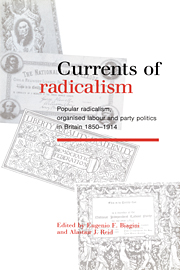 Currents of Radicalism
Currents of Radicalism Book contents
- Frontmatter
- Contents
- Notes on contributors
- Preface
- 1 Currents of radicalism, 1850–1914
- Part I Continuities in popular radicalism
- 2 The old radicalism and the new: David Urquhart and the politics of opposition, 1832–1867
- 3 Radicalism and popular culture: the Tichborne case and the politics of ‘fair play’, 1867–1886
- 4 Popular politics and the limitations of party: Wolverhampton, 1867–1900
- 5 Nonconformity and trade unionism: the Sheffield outrages of 1866
- Part II The Liberal party and the people
- Part III Radicals, Liberals, and the Labour party
- Index
5 - Nonconformity and trade unionism: the Sheffield outrages of 1866
from Part I - Continuities in popular radicalism
Published online by Cambridge University Press: 07 September 2010
- Frontmatter
- Contents
- Notes on contributors
- Preface
- 1 Currents of radicalism, 1850–1914
- Part I Continuities in popular radicalism
- 2 The old radicalism and the new: David Urquhart and the politics of opposition, 1832–1867
- 3 Radicalism and popular culture: the Tichborne case and the politics of ‘fair play’, 1867–1886
- 4 Popular politics and the limitations of party: Wolverhampton, 1867–1900
- 5 Nonconformity and trade unionism: the Sheffield outrages of 1866
- Part II The Liberal party and the people
- Part III Radicals, Liberals, and the Labour party
- Index
Summary
In a lecture delivered to the Baptist Historical Society in 1986 the Cambridge theologian, David Thompson, revealed that his grandfather had kept on his desk the busts of three noted contemporaries – those of W. E. Gladstone, Robert Blatchford, and John Clifford. It is difficult to imagine three individuals who might better epitomise some of the diverse strands of which nineteenth-century popular radicalism was composed: the Evangelical and Liberal politician, the jingo and socialist journalist, the reforming, Nonconformist minister from a lace factory. There can be no doubt that Gladstone and Blatchford – or at least the forces which they represented – have tended to dominate the historiographical stage, pushing Clifford's Nonconformity somewhat into the shadows. With a history going back at least to the seventeenth century, trade unionism was certainly a major institutional forum of radical thought and activity. Yet Nonconformity had an equally long association with radical movements. Despite the hyperbole, there was some truth in the suggestion of one mid-Victorian writer that its entire history was ‘a record of noble and often painful struggles for popular rights’. A more recent, though not necessarily less partisan, observer has argued that the Evangelicalism with which Nonconformity was deeply imbued was nothing less than the religious expression of radicalism.
In the course of the nineteenth century both trade unionism and Nonconformity grew numerically and acquired greater influence.
- Type
- Chapter
- Information
- Currents of RadicalismPopular Radicalism, Organised Labour and Party Politics in Britain, 1850–1914, pp. 86 - 106Publisher: Cambridge University PressPrint publication year: 1991
